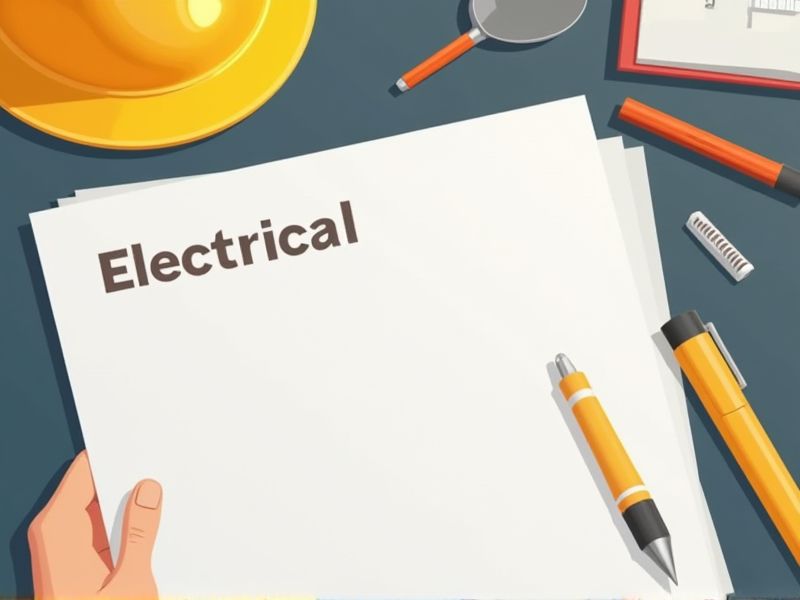
Electrical Maintenance Technicians handle complex electrical systems that require a thorough understanding of circuitry, safety protocols, and technical problem-solving. Certifications ensure technicians possess the skills needed to safely and effectively work with high-voltage equipment and sensitive electronic devices. Regulatory compliance and industry standards often mandate specific certifications to minimize the risk of accidents and equipment failure. Here are some important certifications you might need as an Electrical Maintenance Technician.
Journeyman Electrician License
The Journeyman Electrician License ensures that the Electrical Maintenance Technician has a standardized level of knowledge and skill, which reduces the risk of unsafe installations and electrical hazards. With the license, the technician gains credibility and trust from employers and clients, potentially leading to more job opportunities and higher wages. Licensing often involves rigorous training and testing, ensuring the technician can safely and effectively handle complex electrical systems. Obtaining the license ensures compliance with local and national electrical codes and regulations, avoiding potential legal issues and fines.
OSHA 30-Hour Construction Safety Certification
Electrical maintenance technicians face high-risk environments, making the OSHA 30-Hour Construction Safety Certification crucial for enhancing their understanding of workplace safety standards. This certification equips them with knowledge to identify, minimize, or eliminate hazards associated with electrical work. With increased awareness, they can prevent accidents and injuries, reducing downtime and associated costs. Many employers also require this certification to meet compliance standards and ensure a safe working environment.
NFPA 70E Electrical Safety in the Workplace Certification
NFPA 70E Electrical Safety in the Workplace Certification provides crucial knowledge on preventing electrical hazards, enhancing technician safety during maintenance tasks. This certification ensures compliance with legal standards, reducing the risk of workplace accidents and potential liabilities for employers. Understanding the latest safety guidelines fosters a safer work environment, promoting efficiency and productivity. Access to up-to-date electrical safety protocols empowers technicians to effectively manage and mitigate workplace risks.
Lockout/Tagout (LOTO) Certification
LOTO certification ensures that electrical maintenance technicians are trained to properly isolate energy sources, preventing accidental injuries or fatalities. The certification process instills knowledge of OSHA regulations, promoting compliance and reducing the risk of costly fines for companies. Understanding LOTO procedures safeguards equipment from unexpected energization during maintenance, which helps decrease downtime and extend equipment life. LOTO training enhances technicians' ability to identify and mitigate potential hazards, fostering a safer work environment for all employees.
PLC Programming and Troubleshooting Certification
A certification in PLC programming and troubleshooting enhances an electrical maintenance technician's ability to manage and maintain automated systems effectively. The growing complexity of industrial automation systems necessitates a higher level of skill in understanding programmable logic controllers. Such certification ensures technicians are updated with the latest technological advancements, improving system reliability and operational efficiency. Employers value certified individuals as they reduce downtime and increase productivity due to their precise problem-solving skills.
Certified Maintenance & Reliability Technician (CMRT)
The CMRT certification verifies an individual's expertise in preventive, predictive, and proactive maintenance practices, which enhances an Electrical Maintenance Technician's ability to minimize downtime. By being certified, technicians can better understand the machinery and systems they work with, leading to more efficient troubleshooting and repairs. The certification ensures technicians are up-to-date with industry best practices, which improves safety protocols and reduces workplace accidents. Organizations that employ CMRT-certified technicians often experience increased equipment reliability and reduced maintenance costs, contributing to improved operational efficiency.
National Electrical Code (NEC) Compliance Certification
Compliance with the National Electrical Code (NEC) ensures that Electrical Maintenance Technicians understand and adhere to safety standards, reducing the risk of electrical fires and accidents. Certification verifies that technicians possess the necessary competency to install and maintain electrical systems in compliance with current regulations. NEC compliance certification often serves as a prerequisite for employment, reflecting a technician's commitment to industry standards. Adhering to the NEC enhances public trust and minimizes liability issues for employers, fostering a safer work environment.
Arc Flash Safety Certification
Arc Flash Safety Certification is necessary because it ensures that electrical maintenance technicians understand the risks associated with arc flashes, which can lead to severe injuries. Proper certification equips technicians with skills to implement safety measures effectively, reducing workplace accidents. This knowledge also helps comply with national safety standards such as NFPA 70E, preventing legal liabilities. Certified technicians are more likely to identify potential hazards, ensuring safer work environments.
Industrial Motor Control Certification
An Industrial Motor Control Certification ensures an electrical maintenance technician understands the intricate systems governing motor operations, reducing operational downtime. Certification provides up-to-date knowledge of safety protocols, decreasing the risk of workplace accidents. Employers recognize certification as a standard of competence, often leading to better job opportunities and increased salary potential. Technicians with certification can troubleshoot complex motor control issues more efficiently, enhancing overall productivity.
Electrical Troubleshooting and Testing Certification
Electrical Troubleshooting and Testing Certification equips technicians with specialized knowledge to accurately diagnose electrical system issues, reducing downtime and improving operational efficiency. By obtaining this certification, technicians demonstrate their proficiency in handling complex electrical systems, which can enhance workplace safety by minimizing the risk of electrical accidents. Certification ensures that technicians are updated with the latest industry standards and best practices, fostering consistent and reliable maintenance procedures. Employers often prefer certified technicians as they bring increased credibility and assurance of skill competency to the organization.
Summary
By obtaining certifications, you enhance your credibility and skill set as an Electrical Maintenance Technician. This often leads to improved job prospects and opportunities for career advancement. Employers tend to favor certified technicians, resulting in higher job security and possibly increased salaries. Certification signals both competence and a commitment to professional development in the field.
